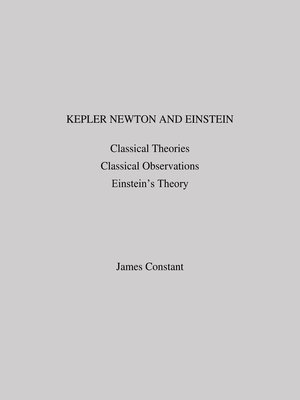
Sign up to save your library
With an OverDrive account, you can save your favorite libraries for at-a-glance information about availability. Find out more about OverDrive accounts.
Find this title in Libby, the library reading app by OverDrive.



Search for a digital library with this title
Title found at these libraries:
| Library Name | Distance |
|---|---|
| Loading... |
How well do Newton's and Einstein's theories explain Kepler's observations of planetary orbits? Do Newton's laws of motion apply in Newton's gravitation? Are Kepler's Newton's and Einstein's laws universal? Does Einstein's theory replace Newton's theory?Newton's laws of motion and gravitation admit fictional centrifugal forces in angular motions and, with such fictional forces, Newton's law of gravitation acting radially predicts all types of conical orbits including Kepler's laws. The idea that Newton's laws admit fictional centrifugal forces has a significant impact on all theories in cosmology which obtain information from radial measurements. For the most part, they connect Newton's radial theory to Kepler's conical orbits. Consider, for example, the bending of light, red shift and precession of perihelia observations. These are the classical observations. In all these classical cases, Newton's fictional centrifugal forces predict Kepler's conical planetary and galactic orbits. Most planets and galaxies are observed in almost circular orbits. However, beyond the galactic system, the existence of Kepler's and Newton's laws remains open.The adoption of Einstein's theory destroys Newton's theory because Newton's law of gravitation force F so abundantly confirmed would increase by a factor 2 making it unconformable in practice. Redshift predictions would increase by a factor 2 and orbital periods would decrease by a factor about 30% making Einstein's predictions unconformable. Einstein's theory does not replace Newton's theory.







